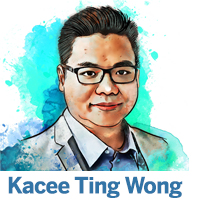Tommy Suen Chun Kit and Kacee Ting Wong say LegCo’s strike-down of bill should be accepted by all, including the Judiciary
The Hong Kong Court of Final Appeal (CFA) ruled in W vs Registrar of Marriages (2013) that the Marriage Ordinance and Matrimonial Causes Ordinance must be interpreted to include postoperative male-to-female transsexuals as “women” for the purpose of marriage. Enjoying an overwhelming edge over proponents of same-sex marriage, the Legislative Council vetoed amendments to the marriage law put forward by the Hong Kong Special Administrative Region government the following year. The government has not put forward an amendment to the marriage law since. History appeared to repeat itself on Tuesday, when LegCo vetoed the Registration of Same-sex Partnership Bill, which was submitted by the government in July to fulfill its “positive obligation” under Article 14 of the Hong Kong Bill of Rights as declared by the CFA in the case of Sham Tsz Kit vs Secretary for Justice (FACV 14/2022).

 This article aims at clearing up some of the confusion arising from the legislative debate over the bill in July. Lawmaker Priscilla Leung Mei-fung and others argued that the government’s proposal would open a Pandora’s box and undermine traditional family values in the city. Many locals have supported her stance. The Democratic Alliance for the Betterment of Hong Kong and the Federation of Trade Unions have also criticized the proposal. Proponents, on the other hand, disagreed with them, but they have committed a monumental error by arguing that lawmakers’ opposition to the proposal constituted an attempt to disrespect court orders.
This article aims at clearing up some of the confusion arising from the legislative debate over the bill in July. Lawmaker Priscilla Leung Mei-fung and others argued that the government’s proposal would open a Pandora’s box and undermine traditional family values in the city. Many locals have supported her stance. The Democratic Alliance for the Betterment of Hong Kong and the Federation of Trade Unions have also criticized the proposal. Proponents, on the other hand, disagreed with them, but they have committed a monumental error by arguing that lawmakers’ opposition to the proposal constituted an attempt to disrespect court orders.
READ MORE: HKSAR govt to table same-sex partnership bill to legislature
Lawmakers’ opposition to the bill cannot be interpreted as an act to disrespect court orders. Nor is it a hidden ploy to roll back the ruling of the CFA. As Grenville Cross SC has correctly pointed out, “the council (LegCo), elected as it is by various sectors in the community, is supreme. Moreover, if it dislikes the bill, it has the constitutional right to reject it, ramifications notwithstanding” (South China Morning Post, Aug 27). Article 73 of the Basic Law provides that a key function of LegCo is to enact, amend or repeal law in accordance with the provisions of the Basic Law. The court is in no position to order the legislature to pass a bill.
Hong Kong Chief Executive John Lee Ka-chiu said on July 15 that while authorities had to come up with a framework for same-sex partnership recognition in line with the CFA ruling, his administration will respect LegCo’s power to pass or veto bills.
Although the worry that the bill could precipitate an inescapable journey toward same-sex marriage was overblown, many lawmakers were afraid that the bill — if enacted — would lay a strong foundation for promoting same-sex marriage in Hong Kong in a gradual manner.
Proponents argue that opposition to the setup of an alternative framework for registration of same-sex partnership will take the city from the frying pan of discrimination against LGBTQ+ supporters into the fire of exclusiveness. Some argue that the establishment of an alternative framework is an acid test of whether Hong Kong can still be called an inclusive society. Our think tank thinks that the vetoing of the bill will not lock Hong Kong up in a narrow esoteric world, as proponents suggest. Inclusivity and the imposition of reasonable restrictions on the rights of same-sex couples are not incompatible.
Same-sex matrimonial rights are severely restricted in many places, such as Dubai, wherein it is an offense even to show support for LGBTQ+ rights. The above restrictions have not prevented Dubai from becoming an inclusive society to attract overseas talent and investment. The success of the Dubai International Financial Centre (DIFC) speaks for itself. It was reported in 2022 that the DIFC had a 19 percent annual increase in nonfinancial firms, bringing the total number of international companies, family businesses and corporate service providers to over 3,000 (Dubal International Financial Centre, in Wikipedia). It is also worth noting that Dubal is a Certified Autism Destination, which is an important symbol of inclusivity (Living Inclusion: A mother’s Perspective on Dubal’s Journey to Becoming a Certified Autism Destination, in IBCCES).
ALSO READ: Same-sex partnerships should not be called marriage under HK law
Another issue of concern is lawmaker Erik Yim Kong’s proposal to set up a recordkeeping arrangement in the city, instead of issuing registration certificates for same-sex couples. But the government said recordkeeping alone is insufficient to allow the authorities to verify “marriage” overseas. Solicitor-General Llewellyn Mui Kei-fat said recordkeeping alone would not enable the government to verify whether the applications met the criteria stipulated by the bill (South China Morning Post, July 26).
The fierce legislative debate over the bill in July and its ultimate strike-down on Tuesday show that the patriot-only LegCo is not a “rubber stamp” as claimed by its critics, and that it is ready to exercise its veto power if necessary. By voting down the bill, the lawmakers have discharged their constitutional function, and their decision, which reflects the mainstream public opinion, should be respected by every member of Hong Kong society, including the Judiciary..
Tommy Suen Chun Kit is a community services officer of BPA Eastern District, director of youth development affairs of the Chinese Dream Think Tank.
Kacee Ting Wong is a barrister, a part-time researcher of Shenzhen University’s Hong Kong and the Macao Basic Law Research Center, and chairman of the Chinese Dream Think Tank.
The views do not necessarily reflect those of China Daily.


